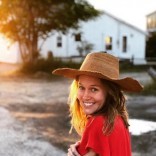Ordinary
Courtney Craggett
We’d been waiting for our powers for so long. They should have been here by now, our superspeed and bulletproof skin and x-ray vision. When that bully knocked us down in fourth grade, our hands should have lit up with electricity, thrown him high into the changing leaves above the schoolyard. When that car came speeding out of nowhere, our muscles should have grown and bulged through our shirts, stopped it dead in its tracks. When that man cornered us in the alley the adrenaline should have turned our screams supersonic, or our feet faster than lightning.
But none of that happened. We remained ordinary and powerless. The bad things that happen all over the world happened to us too, and we couldn’t stop them. We sat by our children’s hospital beds, took out second mortgages, taught ourselves self-defense, felt too cold or too hot or too tired or too weak.
We did the little things we could. Went to work, planted gardens, loved our children as strongly and gently as we knew how.
When the hurricane struck and flooded our city streets into rivers, we pulled our boats out of storage and hitched them to the backs of our trucks. We lined the freeway, blinkers flashing to exit onto the flooded streets. We sailed the town, pulled children out of upstairs windows, carted belongings to dry land. Maybe someone with freeze breath will come along, we said, but no one did, so we sailed anyway.
When school teachers couldn’t pay their bills, we circled the capitol buildings and demanded higher wages. We brought guitars and microphones and drums and picnic blankets and pizza, and we marched until they had to hear. Mind control would make this so much easier, we said, but without it, we kept marching.
When our country locked its borders on anyone who prayed differently, held them hostage in airports or detention centers, we crammed ourselves into the baggage claim area, kept vigil day after day and night after night. Pastors preached love and lawyers argued justice and even the security guards passed out snacks and bottled water. “We love you! We love you!” we shouted through the divide to those detained inside the terminal. Too bad we can’t teleport them to us, we said, but since we couldn’t, we pulled out our sleeping bags and refused to leave until they were free.
When the scientists told us we’d warmed the world too much, when the forest fires blazed each summer and the blizzards blinded each winter, we demanded clean energy, reduced our carbon footprint, bought less, reused more, took public transportation. We would have loved the power of flight then, to spin the world backwards on its axis, turn back time and undo all our mistakes. But without a superman, time moved forward and never back, and so we changed the little bit we could.
When that cop shot that boy, we took to the streets, demanded a fair trial, and when he didn’t get it and that next cop shot that next boy, we demanded it again, and then again, and then again.
We never truly won. Murderers were freed and friends drowned and fires burned. It was easy to become discouraged, to hope some real hero would come along and save the day. But we knew the line. With ordinary power comes ordinary responsibility, and we were ordinary. The smoke would never clear, the wars never end, the hospitals never empty, the clouds never finally part, but we would keep going, and maybe that was our superpower, our own redefined victory.
Still, it would have been nice, and sometimes we check, hold our hands out in a lightning storm and wait for a spark. Stand on the top of a tall building and imagine flight. Squint hard through walls, at a world we wish we could see.















